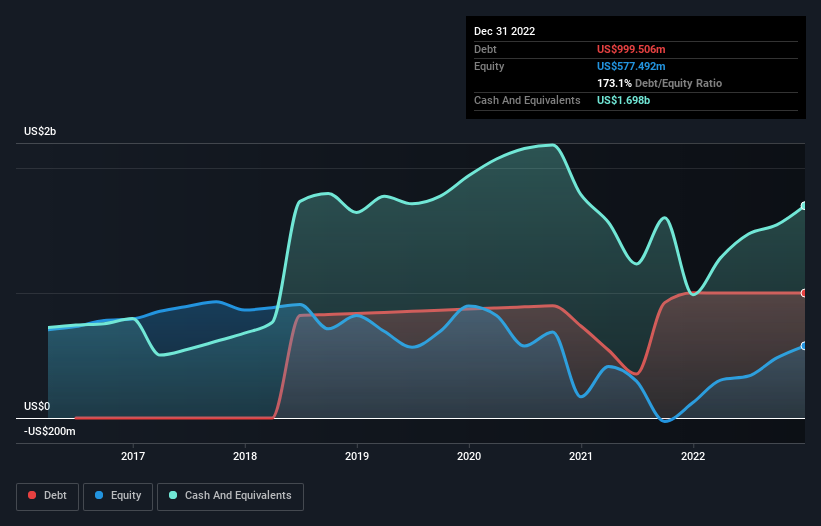
Warren Buffett famously said, 'Volatility is far from synonymous with risk.' So it seems the smart money knows that debt - which is usually involved in bankruptcies - is a very important factor, when you assess how risky a company is. We note that Atlassian Corporation (NASDAQ:TEAM) does have debt on its balance sheet. But the real question is whether this debt is making the company risky.
Why Does Debt Bring Risk?
Debt assists a business until the business has trouble paying it off, either with new capital or with free cash flow. Ultimately, if the company can't fulfill its legal obligations to repay debt, shareholders could walk away with nothing. However, a more common (but still painful) scenario is that it has to raise new equity capital at a low price, thus permanently diluting shareholders. Of course, debt can be an important tool in businesses, particularly capital heavy businesses. When we think about a company's use of debt, we first look at cash and debt together.
View our latest analysis for Atlassian
What Is Atlassian's Debt?
The chart below, which you can click on for greater detail, shows that Atlassian had US$999.5m in debt in December 2022; about the same as the year before. But on the other hand it also has US$1.70b in cash, leading to a US$698.8m net cash position.

How Healthy Is Atlassian's Balance Sheet?
According to the last reported balance sheet, Atlassian had liabilities of US$1.64b due within 12 months, and liabilities of US$1.39b due beyond 12 months. Offsetting these obligations, it had cash of US$1.70b as well as receivables valued at US$354.8m due within 12 months. So its liabilities total US$983.3m more than the combination of its cash and short-term receivables.
Of course, Atlassian has a titanic market capitalization of US$46.6b, so these liabilities are probably manageable. Having said that, it's clear that we should continue to monitor its balance sheet, lest it change for the worse. While it does have liabilities worth noting, Atlassian also has more cash than debt, so we're pretty confident it can manage its debt safely. There's no doubt that we learn most about debt from the balance sheet. But ultimately the future profitability of the business will decide if Atlassian can strengthen its balance sheet over time. So if you're focused on the future you can check out this free report showing analyst profit forecasts.
In the last year Atlassian wasn't profitable at an EBIT level, but managed to grow its revenue by 31%, to US$3.2b. With any luck the company will be able to grow its way to profitability.
So How Risky Is Atlassian?
While Atlassian lost money on an earnings before interest and tax (EBIT) level, it actually generated positive free cash flow US$779m. So taking that on face value, and considering the net cash situation, we don't think that the stock is too risky in the near term. The good news for Atlassian shareholders is that its revenue growth is strong, making it easier to raise capital if need be. But that doesn't change our opinion that the stock is risky. When analysing debt levels, the balance sheet is the obvious place to start. However, not all investment risk resides within the balance sheet - far from it. We've identified 2 warning signs with Atlassian , and understanding them should be part of your investment process.
Of course, if you're the type of investor who prefers buying stocks without the burden of debt, then don't hesitate to discover our exclusive list of net cash growth stocks, today.
New: Manage All Your Stock Portfolios in One Place
We've created the ultimate portfolio companion for stock investors, and it's free.
• Connect an unlimited number of Portfolios and see your total in one currency
• Be alerted to new Warning Signs or Risks via email or mobile
• Track the Fair Value of your stocks
Have feedback on this article? Concerned about the content? Get in touch with us directly. Alternatively, email editorial-team (at) simplywallst.com.
This article by Simply Wall St is general in nature. We provide commentary based on historical data and analyst forecasts only using an unbiased methodology and our articles are not intended to be financial advice. It does not constitute a recommendation to buy or sell any stock, and does not take account of your objectives, or your financial situation. We aim to bring you long-term focused analysis driven by fundamental data. Note that our analysis may not factor in the latest price-sensitive company announcements or qualitative material. Simply Wall St has no position in any stocks mentioned.
About NasdaqGS:TEAM
Atlassian
Through its subsidiaries, designs, develops, licenses, and maintains various software products worldwide.
Flawless balance sheet with high growth potential.


